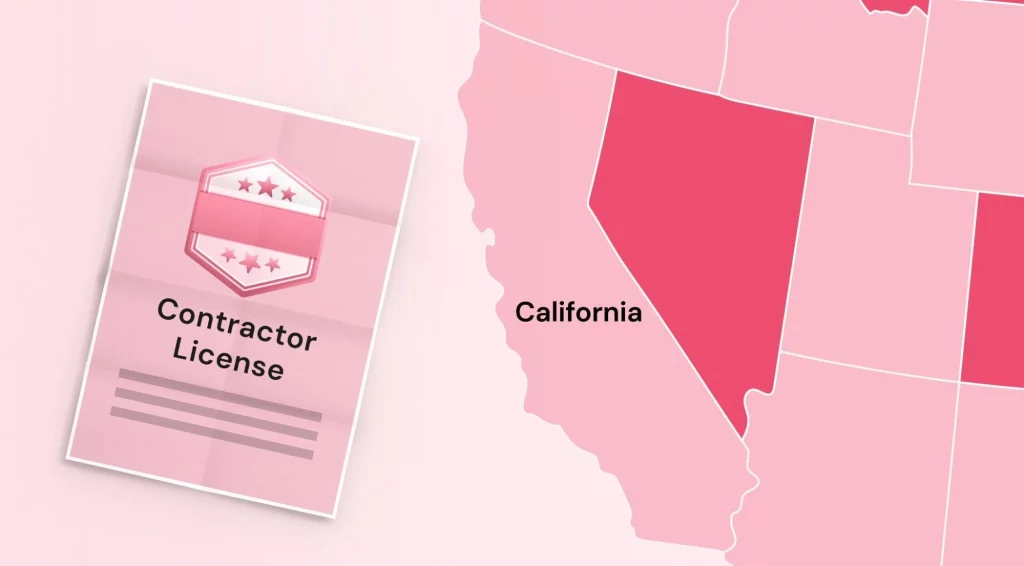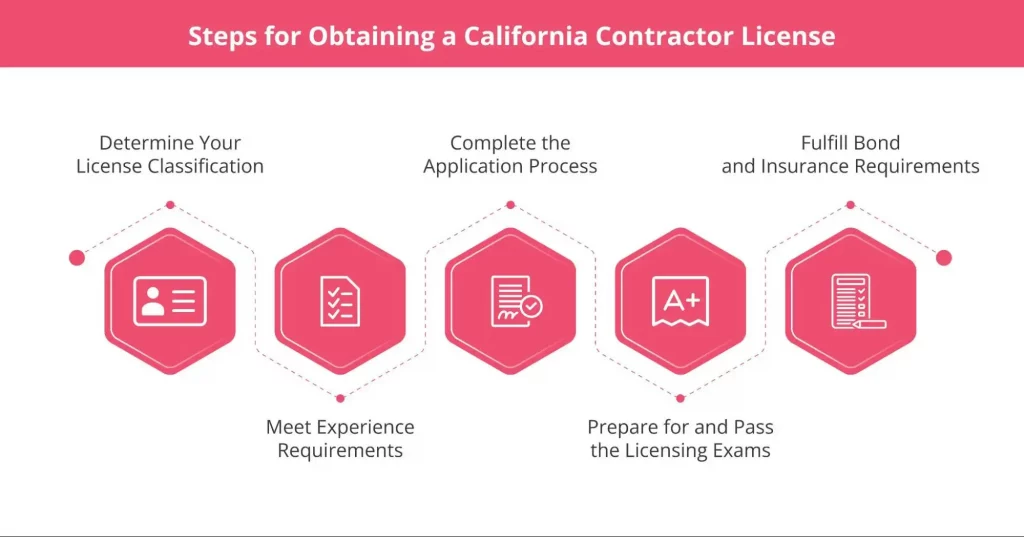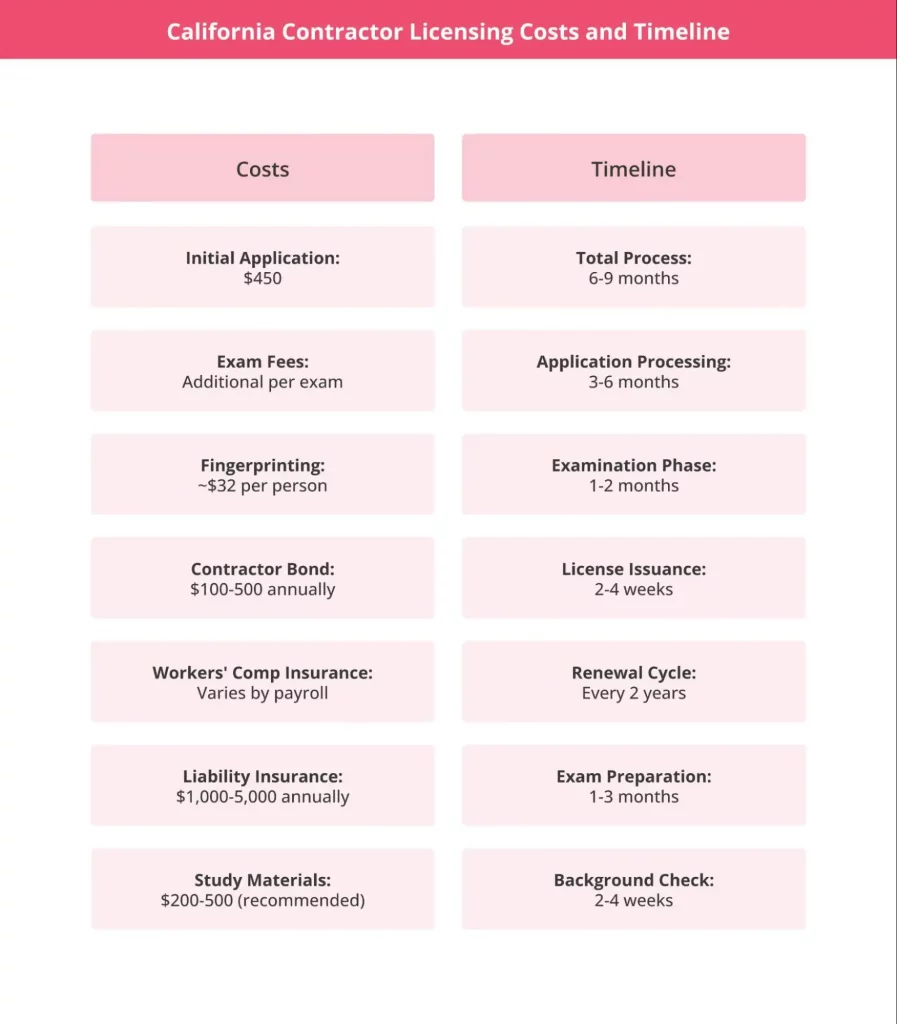In December 2024, the California Contractors State License Board clarified that any unlicensed contractor can only take up a construction project of less than $1000. This includes the total cost of labor, materials and other associated expenses.
In California’s construction landscape, your contractor’s license represents your badge of trust and credibility. Secure a California contractor license to kickstart a respected, opportunity-rich career that signals your professionalism to the market. This credential verifies your technical expertise and assures clients you are equipped to deliver quality results. It will open doors that remain unavailable to unlicensed operators and provide peace of mind to your clients.
The journey to licensure presents a maze of requirements that can challenge you as a determined professional. Each step requires careful navigation. You will need to select the appropriate license classification, document years of experience, meet stringent financial requirements, and pass comprehensive exams. Many aspiring contractors become overwhelmed by complex regulations and paperwork. You might feel uncertain about which path to take or how to prepare effectively.
This guide simplifies that journey. It helps you understand how to get a contractor license in California with information on classification and eligibility, application tips, exam prep strategies, and post-licensing compliance, enabling you to approach each step with clarity and confidence.
 What are the California Contractor License Requirements?
What are the California Contractor License Requirements?
California maintains strict regulatory oversight of the construction industry through extensive licensing requirements that differ from those of other states. These rules are designed to protect consumers and ensure quality workmanship.
1. Understand License Classifications
The California Contractors State License Board recognizes over 70 different license classifications divided into three main categories.
- Class A General Engineering licenses cover infrastructure projects like highways and bridges.
- Class B General Building licenses apply to structures requiring at least two unrelated building trades.
- Class C Specialty licenses encompass a range of trades, including electrical work, landscaping, flooring, and more specific home improvement areas.
2. Meet the Eligibility Criteria
You must be at least 18 years old with a valid Social Security number or Individual Taxpayer Identification Number to apply for a general contractor license in California. Your application requires documentation of at least four years of journey-level experience within the past ten years. Educational qualifications can substitute for a portion of the experience requirement, with technical degrees potentially counting for up to three years.
3. Recognize the Role of the CSLB
The Contractors State License Board serves as the regulatory authority overseeing all aspects of contractor licensing in California. The CSLB, operating under the California Department of Consumer Affairs, processes applications, administers examinations, investigates consumer complaints, and enforces compliance with state laws and regulations. This board protects consumers from substandard work while maintaining the integrity of the construction industry through consistent enforcement of licensing standards.
4. Comply With the Legal Compliance
Working without proper licensing in California puts you at risk of significant legal and financial consequences. Unlicensed contracting constitutes a misdemeanor punishable by substantial fines and potential jail time for repeat offenders. Clients can legally withhold payment for work performed without appropriate licensing, and you will lose mechanic’s lien rights that would otherwise protect your payment interests on construction projects. The Department of Industrial Relations may also impose penalties for labor law violations.
5. Fulfil the California Contractor License Renewal Requirements
Don’t forget to renew your California contractor license every two years to maintain active status. The renewal process involves submitting the appropriate fee and verifying continued compliance with bond and insurance requirements. Remember to report changes in business structure, personnel, or contact information to the CSLB within 90 days.
|
How to Get a Contractor License in California: Step-by-Step Guide
Let’s walk through the process of obtaining your California contractor license. Following this structured approach streamlines the process. Each stage builds upon the last, guiding you towards successful licensure.
Step #1: Determine Your License Classification
Your first task involves selecting the appropriate license classification that aligns with your experience and future business plans.
- Class A: General Engineering Contractor: This license permits work on fixed works that require specialized engineering knowledge. Examples include roads, bridges, and other large-scale infrastructure projects. This classification encompasses projects that impact land and water resources.
- Class B: General Building Contractor: You will be able to build or remodel structures intended for human occupancy with this license. This includes homes, offices, and commercial structures. A Class B license typically involves projects that require two or more unrelated trades.
- Class C: Specialty Contractor: This class covers over 40 specific trades, such as plumbing, electrical, and HVAC. Choose a Class C license when your work focuses on a single, specialized area. Each subclassification has distinct requirements.
Pick the correct classification from the outset to avoid future complications.
Step #2: Meet Experience Requirements
California requires documented journey-level experience demonstrating your technical competence and industry knowledge before granting license eligibility. Journey-level means working beyond apprentice status with responsibilities including planning, supervision, and technical execution.
- Four-Year Requirement: You will need to prove at least four years of journey-level experience. This experience must be obtained in the classification for which you are applying. Make sure you have acquired this experience within the last decade.
- Experience Documentation: Get ready to provide detailed documentation of your work history. This often includes employer certifications, pay stubs, or tax returns. The CSLB may contact your certifiers to verify the information.
- Education Alternatives: While four years of experience is standard, you can substitute some education for a portion of it. A bachelor’s degree in construction management, for instance, could count for up to three years of experience. Apprenticeship programs also provide valuable pathways.
 Step #3: Complete the Application Process
Step #3: Complete the Application Process
Now let’s tackle the application process with careful preparation and submission of required forms and supporting documentation to the Contractors State License Board.
- Application Form Submission: Fill out form #7065 (Application for Original Contractor License) with accurate information about your business structure, personnel, and experience qualifications. Make sure every section is complete as incomplete applications face automatic rejection.
- Supporting Documentation: Prepare certified experience verification forms, business formation documents, and identification for all listed personnel. Military veterans should include form DD-214 along with detailed descriptions of construction duties performed during service.
- Application Fees: Submit the non-refundable $450 application fee covering processing costs and initial license issuance. Additional fees apply for fingerprinting services, examination scheduling, and license activation upon approval.
- Fingerprinting Requirements: All personnel listed on your application must complete Live Scan fingerprinting for required background checks. Criminal history requires disclosure and explanation but does not automatically disqualify applicants from licensing consideration.
Step #4: Prepare for and Pass the Licensing Exams
The examination phase tests your knowledge of business practices and trade-specific skills through computer-based assessments.
- Law and Business Exam: All applicants must pass this 100-question multiple-choice test covering business organization, contracts, safety regulations, and employment laws. The exam requires a 72% passing score and applies to all license classifications.
- Trade Examination: Your classification-specific exam evaluates technical knowledge related to your trade area. These exams typically contain 100 multiple-choice questions covering materials, methods, codes, and safety procedures relevant to your specialty.
- Study Resources: Boost your chances by using CSLB study guides, commercial test preparation courses, and practice examinations. Many successful applicants combine self-study with structured review programs to maximize their first-attempt success rates.
- Testing Procedures: Examinations take place at testing centers throughout California with flexible scheduling options. You will likely complete each exam within 2-3 hours, with results typically available immediately upon completion.
Step #5: Fulfill Bond and Insurance Requirements
Protect your business and clients by meeting financial requirements that demonstrate your financial responsibility as a licensed contractor in California.
- Contractor License Bond: Secure a $25,000 contractor license bond from an approved surety company. This bond protects consumers against financial losses resulting from violations of contractor license law or abandoned projects.
- Workers’ Compensation Insurance: Get workers’ compensation coverage if you employ workers in your business. Even sole proprietors with no employees must file a workers’ compensation exemption certificate acknowledging their understanding of these requirements.
- Liability Insurance: While not mandated by the state, liability coverage shields your business against third-party claims for property damage or bodily injury. Most commercial clients require minimum coverage amounts ranging from $1-2 million before awarding contracts.
- Qualifying Individual Bond: Responsible managing officers or employees serving on multiple licenses must secure an additional $25,000 qualifying individual bond. This applies when the same person acts as the qualifier for more than one licensed contracting business.
What is the California Contractor License Cost?
Obtaining your California contractor license requires financial planning and patience as you navigate through the multi-stage application and examination process. The California contractor license cost includes several components that you should budget for in advance.
- Application and Testing Fees: Your initial application costs $450, with additional charges for examination scheduling applicable per exam. Fingerprinting services add approximately $32 per person for all personnel listed on your application. License activation after passing exams requires additional fees before your license becomes active.
- Bond and Insurance Costs: Your mandatory $25,000 contractor license bond can cost between $100 and $500 annually, depending on your credit history. Workers’ compensation insurance premiums vary based on payroll size and classification codes. Liability insurance can add $1,000 and $5,000 annually for standard coverage levels required by most commercial clients.
- Education and Preparation Expenses: Consider investing in study courses or exam preparation materials. These resources can significantly improve your chances of passing the exams on your first attempt. Think of these as investments in your success.
The total cost of a California contractor license typically ranges from $1,500 to $3,000 for the initial licensing process, with ongoing expenses for renewals and insurance maintenance.
How Long Does It Take to Get a Contractor License in California?
The licensing journey requires patience as you move through several required steps. How long it takes to get a contractor license in California depends on your preparation and the current CSLB processing times.
You can expect to complete the licensing process within 6-9 months from initial application to license issuance. Application processing typically requires 3-6 months before examination eligibility. After passing exams, license issuance takes 2-4 weeks upon submission of required bond and insurance documentation.
Factors Affecting Timeline
Several factors can influence how long it takes to get a contractor license in California:
- Completeness of your application (incomplete applications cause delays)
- Current CSLB processing volume
- Your preparation level for exams
- How quickly you secure bonds and insurance
- Background check processing time
With optimal preparation and timely responses to any CSLB inquiries, some applicants complete the process in as little as 4-5 months, while others may experience delays extending the process to a year or more.
 How Do You Maintain and Renew Your California Contractor License?
How Do You Maintain and Renew Your California Contractor License?
Your California contractor license requires ongoing attention to compliance requirements throughout your business operation to maintain good standing with the CSLB.
- Renewal Process and Deadlines: Mark your calendar to renew your license every two years before the expiration date marked on your license. The CSLB sends renewal notices approximately 60 days before expiration, with current license renewal fees set at $450.
- Continuing Education Requirements: Most general and specialty contractors face no mandatory continuing education for license renewal. Only specific classifications, like asbestos abatement, require formal continuing education. Stay sharp by voluntarily pursuing ongoing training in current building codes and industry practices to maintain professional competence.
- Updating Bond and Insurance Coverage: Don’t let your coverage lapse! Your contractor license bond and workers’ compensation insurance require timely renewal to prevent automatic license suspension. Send new certificates to the CSLB whenever you change insurance providers or coverage levels.
- Complying with Changing Regulations: Building codes and contractor regulations evolve regularly, requiring your ongoing attention to maintain compliance. Be sure to report business changes, including address, personnel, and business structure, to the CSLB within 90 days.
|
Final Words
Obtaining your California contractor license represents a significant professional milestone that opens doors to expanded business opportunities and client trust. The multi-step process requires dedication as you document experience, complete application requirements, pass examinations, and secure financial protections.
Your investment in proper licensing yields substantial returns through increased project access, enhanced legal protections, and enhanced market credibility. The challenges of obtaining a license should not discourage you from pursuing this valuable credential. With proper planning, thorough preparation, and attention to detail, you can efficiently navigate the requirements.
Visualizing your projects effectively helps complement your professional credentials when presenting to potential clients. Foyr Ideate, an AI-powered interior design generator, helps contractors create stunning designs that clearly convey concepts during the ideation phase. Our platform helps you transform client presentations and win more bids through compelling visual storytelling that showcases your professional capabilities.
Sign up for a 14-day free trial and discover how this intuitive platform can help your contractor work in California.
DISCLAIMER: This guide is for informational purposes only. Licensing regulations and requirements are subject to change. Always confirm the most current requirements with the California Contractors State License Board (CSLB) or your local building department before making any decisions based on this information.
FAQs on California Contractor Licensing
Who needs a contractor’s license in California?
In California, anyone who contracts to perform construction work with a total cost of labor, materials, and other expenses exceeding $500 for a project must be licensed by the Contractors State License Board (CSLB). This ensures consumer protection and quality workmanship across various project types.
How long does it take to become a licensed contractor in California?
The typical timeline for becoming a licensed contractor in California is 6-9 months, from the initial application submission to license issuance. This includes 3-6 months for application processing, 1-2 months for the examination phase, and 2-4 weeks for license issuance after passing exams and submitting required documents.
What is the difference between an A and B contractor’s license in California?
The Class A General Engineering license covers large-scale infrastructure projects like highways and bridges, requiring specialized engineering knowledge. The Class B General Building license is for building or remodeling structures intended for human occupancy, typically involving two or more unrelated trades, such as homes and offices.




 Step #3: Complete the Application Process
Step #3: Complete the Application Process How Do You Maintain and Renew Your California Contractor License?
How Do You Maintain and Renew Your California Contractor License?




